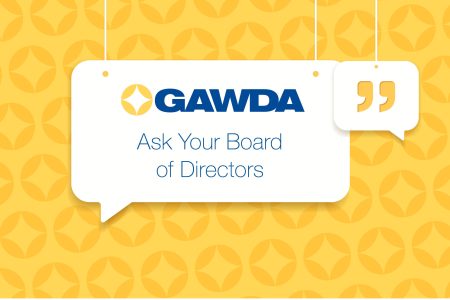In 1972, I graduated LeTourneau College (now LeTourneau University) with a degree in welding engineering and began working for a small manufacturing firm as part of its five-person engineering group. My fellow team members were over 40 years old, which seemed ancient to me at the time. However, I found it rewarding to introduce them to the exciting new ideas I had learned in college, which made the experience enjoyable.
Over time, I noticed I did not share the enthusiasm my colleagues had for the work we performed, and this made me anxious. Eventually I approached my manager with a letter of resignation. He was surprised and noted that upper management was impressed with my work and my ability to stimulate those around me to a higher level of productivity. He offered me an incentive to stay. If I would continue for the balance of six months at my current pace, the company would send me to an executive MBA program in management. Upon completion, I could expect to go into training for his job as he was moving up the ranks. I thanked him but knew that sitting behind a desk solving engineering problems was not the future I wanted.
As a college senior, I was told I would make a good salesman by a perceptive job recruiter. He recognized that I had a personality well suited for building relationships and offered me a position with a starting salary higher than I could get in engineering. My response, “I just crammed five years of engineering studies into four, and you want me to be a salesman!” After my unsatisfactory try at being a welding engineer, I called him back and he had a job for me. That was how I began a satisfying 46 years in technical sales and management. And that first professional relationship I sparked so many years ago as a college senior continued until he passed away at the age of 96.
Who You Are
What enables someone to become a superior engineer, teacher, accountant, doctor, lawyer, business owner or, yes, even a salesman?
That’s a question that has been around for a very long time. As far back as 400 B.C., Empedocles and Hippocrates were observers of behavioral patterns in people. More recently, in 1921, Carl Jung identified “Psychological Types.” In 1928, building on Jung’s work, William Moulton Marston published “The Emotion of Normal People” in which he described humans as behaving along two axes: (1) their actions tending to be either active (extrovert) or passive (introvert), and (2) their view of activity as either preferring to work alone (antagonistic) or preferring to work with others (favorable). Many behavioral tools that help improve human interactions have been introduced because of Marston’s analyses.
In your career, as in life, a good understanding of your personal characteristics helps you navigate relationships. Which of the following four behavioral styles best describes you?
Dominant – These extroverts are task-oriented and like problems and challenges that produce immediate results. Dominants are lions — follow their lead or get out of their way. They are decisive and only need the short Reader’s Digest version of your pitch. They welcome challenging questions and are not afraid of pressure or confrontation. When you give a Dominant individual information, be sure it is correct — they do not suffer fools gladly.
Influencing – These extrovert enthusiasts enjoy being around other people and socializing. They are future-focused networkers, great at motivating others to action, but with a tendency to avoid conflict. Influencers tend to gloss over the fine print and are susceptible to peer pressure. They need clarity and consistency.
Steady – These easy-going introverts like being part of a team where pace and consistency are important. They are as loyal as golden retrievers, sharing a deep need to please others. With hearts full of compassion, they define the word adaptable and have a strong need for close relationships. Steady people often react to sudden changes by holding on stubbornly to what they feel is right. They need careful explanations.
Compliant – These analytical introverts operate with concern for procedure, so provide them with data in a well-organized manner, using as few words as possible, and focus on service. With a tendency to keep emotions in check and to be fearful of mistakes, the Compliant person makes decisions carefully. They like to get it right the first time and often harbor anger regarding past mistakes.
Sales Scenarios
Being aware of different behavioral types helps a salesperson approach a customer in a manner best suited to obtaining a positive result. Here are some examples:
Scenario 1: The direct business owner is a Dominant. You need to stay business-like. Don’t over-promise or joke. Be direct and make him believe he is the winner. Never let him overpower you. Close with confidence.
Scenario 2: The talkative, self-confident restaurant manager is an Influencer. Clearly present the tasks for completion and the steps for accomplishment. This people-focused decisionmaker can easily get off track. Keep time management from becoming a problem by setting strict schedules and deadlines.
Scenario 3: The quiet, friendly construction project manager is a Steady. Keep your approach to this sale slow and friendly. Earn his trust by letting him talk. Take whatever time is necessary before closing the deal.
Scenario 4: The withdrawn purchasing agent is a Compliant. He is looking for information, so give him facts and figures. Answer all his questions, and then close.
If I had Only Known
I wish I had access to this type of behavioral information earlier in my life. I could have avoided a lot of anxiety and problems in personal relationships. The salesperson that is aware of his behavioral style and learns to “blend” it with his customer’s style will be successful. Knowing who you are not only helps you decide which job is best for you, it helps you be the best you can be in that job.
For each of us, life is a journey of exciting realization. Jim Collins in his masterful work, Good to Great, talks about being “the right person, on the right bus, in the right seat.” Through personal reflection and great mentoring, I was able to realize that my combination of Influencing and Dominant enabled me to be a persuading collaborator. This led me to a fulfilling career in sales management with a focus on public speaking, teaching and writing.
How about you? Are you an introvert or extrovert? Do you prefer to work alone or with other people? Knowing who you are is the first step to seeking work that is satisfying and to establishing relationships. Do a little self-assessment now and avoid the “if only I had known.”









